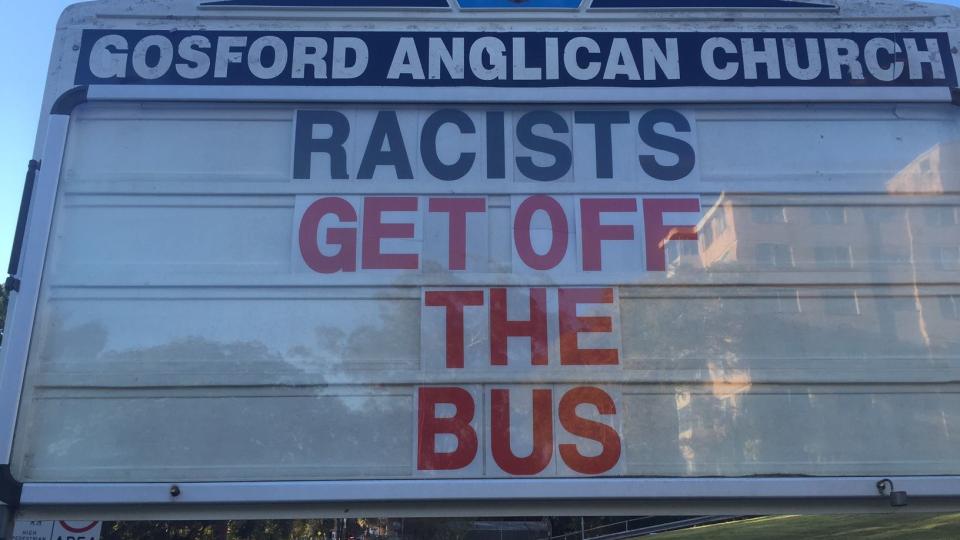Pauline Hanson and the legitimisation of racism

When a gang of right-wing goons from the Party For Freedom (PFF), dressed as stereotypical Muslims, stormed the Sunday service at the Gosford Anglican Church on August 14, their actions were nominally disowned by Pauline Hanson's One Nation Party in a written statement. However, the statement also sought to justify and excuse the actions of the PFF.
The statement said: “One Nation does not have any official affiliation with the Party for Freedom and the executive of One Nation have not been in contact with [the] group, nor were we aware of their plans to attend the Gosford Anglican Church...
"If Party for Freedom members broke the law by attending and disrupting the church, then it is up to the police to handle it. A church is a sacred place to many people so perhaps the Party for Freedom could have had a different approach to making their statement, but this does go to show that tensions are high in the community when it comes to the topic of Islam.
"We have viewed the footage and Party for Freedom members were not violent towards the parishioners. Freedom of speech is a valued part of Australia's democracy.
“We are aware that the Gosford church has taken part in political conversations through portraying their support for refugees and Muslims over the past few years on their church sign and we believe that this has drawn attention to the church and why they were targeted.
“Many Australians feel that politicians have not listened to their concerns regarding Islamic extremism and the teachings of Islam and this has given rise to parties such as One Nation and also to groups such as Reclaim Australia and Party for Freedom who do speak up.”
It went on to warn of future “civil unrest” if these “concerns” were not addressed.
“One Nation does not condone violence of any kind, political-Islam must be attended to via legislation. However if these concerns are not addressed, we believe that there may come a time where there is civil unrest on our streets...”
Make no mistake about this, supporters of One Nation and other far-right parties will read this as a nod to the likes of far-right extremist Philip Galea, who was recently charged in Victoria with planning or preparing for a terrorist act.
Hanson's revival legitimises the more thuggish actions of the various other far-right outfits, just as former PM John Howard did for Hanson herself before she was first elected to parliament in 1996.
Howard legitimised Hanson's racism through his attacks on “political correctness” and the “black-armband view of history”.
Howard worked hard to make racism more acceptable through the so-called “culture wars” that tried to reverse the work of newer historians that exposed the deep racism in Australian history.
This served to legitimise the racist policies of Liberal and Labor governments towards First Nations peoples, refugees and asylum seekers.
But it also served to legitimise the racism of far-right groups that had previously been on the fringe of politics.
Since then, years of increasingly discriminatory and abusive bi-partisan government policies have further encouraged the rise of far-right parties.
Pauline Hanson's One Nation Party rose, fell, and is now on the rise again after winning four Senate seats in the last federal election. Nationally, it won 593,013 first preference votes for the Senate. This was much lower than the 1,007,439 Senate votes One Nation won in the 1998 election (when it had only one Senator elected).
But while One Nation's vote is just 60% of its peak, many other far-right parties took significant shares of the vote in the last election.
Together with parties such as The Liberal Democrats; Derryn Hinch's Justice Party; The Shooters, Fishers and Farmers Party; Family First; the Christian Democrats; the Australian Liberty Alliance and others, far-right parties won more than 2 million votes for the Senate — the greater part of the record 26.3% non-major party vote.
This represents a dangerous advance of the racist far-right and is a measure of the ugly fruit borne out of years of bi-partisan racist policies, constructed around the preservation of a global capitalist system that has created record inequality and, as a consequence, permanent wars.
More that 65 million people have been forced to flee their homes, but the response of most First World governments has been to lock the doors to this sea of human misery.
To justify this inhumanity, the idea that the victims of global capitalism are somehow to blame because they are racially or culturally inferior, is implicitly or explicitly promoted.
In Australia, both the Coalition and Labor are complicit in this. In the wake of their bi-partisan racism, all sorts of smaller racist parties promoting even more inhumane and irrational “solutions” have gained legitimacy.
Can this tide be turned back? And if so, how?
Just as a chain of legitimisation helped revive Pauline Hanson, a mass campaign of delegitimisation is needed to turn back the tide. We need a movement of sustained mass anti-racist mobilisations, but we also need effective political campaigns for real solutions to the grave global crises that have now well and truly spilled beyond all borders.